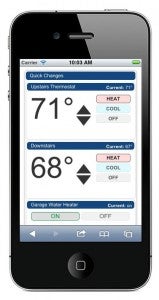EDF Energy Innovation Series Feature #14: Home Energy Management From Consert
 Throughout 2012, EDF’s Energy Innovation Series will highlight around 20 innovations across a broad range of energy categories, including smart grid and renewable energy technologies, energy efficiency financing, and progressive utilities, to name a few. This series will demonstrate that cost-effective, clean energy solutions are available now and imperative to lowering our dependence on fossil fuels.
Throughout 2012, EDF’s Energy Innovation Series will highlight around 20 innovations across a broad range of energy categories, including smart grid and renewable energy technologies, energy efficiency financing, and progressive utilities, to name a few. This series will demonstrate that cost-effective, clean energy solutions are available now and imperative to lowering our dependence on fossil fuels.
Find more information on this featured innovation here.
If innovation is where expertise and opportunity intersect, then San Antonio-based Consert Inc.(Consert) is a perfect case study.
Founded in 2008 by veterans of the telecom industry, Consert’s Virtual Peak PlantTM provides an energy management solution that gives consumers control of the highest energy-consuming electrical devices in their home or business and provides utilities with a low-cost way to tap into an unused energy source during key peak demand periods.
“We find the key is to offer a simple solution to consumers that also benefits utilities,” said Jeff Ebihara, vice president of Consert. “Our goal at Consert has always been to facilitate a mutually beneficial relationship between the consumer and their electric provider.”
The result is cutting-edge technology that connects, monitors and controls high energy-consuming devices including air conditioners, water heaters and pool pumps, which can represent over half of the total load for electric utilities during times of peak demand. The devices in a “Consert-enabled house” are linked using the wireless technology “ZigBee,” creating a Home Area Network (HAN) that can either be controlled remotely or configured to make decisions based on user preferences or outside weather conditions. Utilities may call upon this load during peak hours to reduce stress on the grid, with the consumer never losing comfort or control.
According to Consert, its home automation system can save consumers 15-20 percent on their energy use. When consolidated, these homes add up to a considerable amount of unused energy that utilities do not have to buy, sell or deliver.

This “negawatt” concept isn’t new – a megawatt of energy that is NOT used through demand response is just as helpful for a stable energy supply as a megawatt of new generation. However, the consumer appeal of Consert’s products is more personal and customizable than traditional load control measures. Customers can control their energy consumption 24/7 from any web-enabled device, such as laptop, tablet or smartphone, but most configure the system to work automatically.
The development of a consumer-friendly service that helps save money – and provides some “coolness” while requiring no sacrifice in comfort or convenience – is an important achievement as we look for new ways to reduce energy consumption and increase efficiency. Reducing electricity demand and making more efficient use of electricity is very important both environmentally and for electric grid operators. But beyond the appeal of doing the “right thing,” or the novelty of controlling appliances, there had previously been little to no incentive for consumers to make it a priority. Cutting their energy bill, Ebihara said, has proven a strong incentive.
“Of course there is a small segment of the market that wants to control every last part their energy use,” Ebihara said. “And we are happy to provide that level of control. But we are finding that most people want to “set it and forget it.” They want to save on their energy bill and they might like the convenience of remotely accessing their programs, but they don’t want to have to think about it all the time and they certainly don’t want it to be a hassle.”
Appealing to a broad market has been one of the challenges of HAN products. The industry is young, and products are either complicated or expensive. It may be obvious that Consert wants its product to be ubiquitous, but such products will have to be deployed in large numbers to make a meaningful contribution to peak demand management.
Consert’s systems are available through utility companies, most of which offer the equipment free when customers participate in conservation measures. Others sell the equipment at a deeply-subsidized price. In San Antonio, CPS Energy will deploy Consert systems in 140,000 homes at no charge to the customer, reducing peak demand by 250 megawatts.












